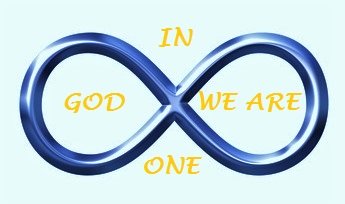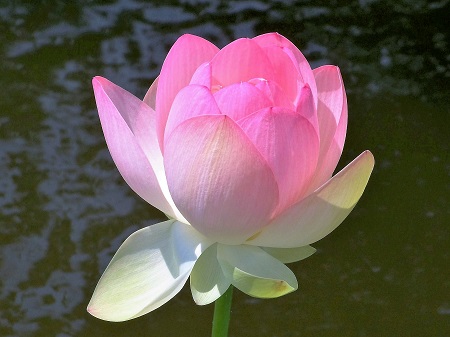More on the Concept of
"In God We are One"
Humans cling to the belief that they are separate beings due to a deep-rooted desire for individuality and autonomy, which offers a sense of personal significance and control over their lives. This belief is reinforced by cultural narratives that celebrate self-reliance and individual achievement, making the notion of being a distinct entity comforting despite its illusory nature. The ego, or the sense of a separate self, plays a crucial role in shaping this perception, as it creates boundaries that define identity and personal experiences. Moreover, the challenge of transcending ego-based consciousness and embracing vulnerability and interconnectedness often leads individuals to retreat into the familiar territory of separation, even as it contributes to feelings of isolation and division.
Embracing the Divine Unity
In a world often marked by division and conflict, the concept of divine unity offers a profound and transformative perspective. The idea that "in God, we are one" serves as a powerful reminder of our interconnectedness and shared existence. This perspective is not only a spiritual principle but also a guiding light for living harmoniously in a diverse and complex world.
The Divine Unity in Religious Traditions
Throughout history, various religious traditions have articulated the notion that nothing can be separate from God. This idea is central to many faiths, emphasizing the omnipresence and omnipotence of the divine.
In Christianity, the apostle Paul eloquently expresses this in his letter to the Ephesians: "There is one body and one Spirit, just as you were called to one hope when you were called; one Lord, one faith, one baptism; one God and Father of all, who is over all and through all and in all" (Ephesians 4:4-6). This passage highlights the unity of all creation under God, reinforcing the belief that we are all part of a single divine entity.
Similarly, in Hinduism, the concept of Brahman represents the ultimate reality, the unchanging, infinite, immanent, and transcendent reality that is the divine ground of all being. The Upanishads, ancient Hindu scriptures, repeatedly emphasize that everything in the universe is a manifestation of Brahman. The famous phrase "Tat Tvam Asi" (Thou art that) encapsulates this idea, suggesting that the essence of the individual soul (Atman) is identical with the essence of the universe (Brahman).
Islam also upholds the unity of God (Tawhid), which asserts that there is only one God, and He is the same throughout all of creation. This principle underscores the interconnectedness of all beings under the divine will. The Quran states, "To Allah belongs whatever is in the heavens and whatever is in the earth. And Allah is over all things competent" (Quran 3:189), affirming that all existence is under the domain of a single, all-encompassing God.
The Philosophical Underpinnings of Divine Unity
Beyond religious doctrine, the concept that "in God, we are one" finds resonance in various philosophical traditions. The idea that the universe is a unified whole, in which all parts are interconnected, has been a subject of contemplation for centuries.
In the philosophy of Spinoza, for example, God and Nature are seen as two names for the same reality. Spinoza's pantheism asserts that everything that exists is a part of God. According to Spinoza, there is only one substance, and that substance is God. Everything else—trees, rocks, people, and planets—is merely a mode or modification of this single substance. This view profoundly influences how we perceive our relationship with the divine and with each other, encouraging a sense of unity and mutual respect.
The Eastern philosophical tradition of Taoism also speaks to this unity. The Tao, or the Way, is considered the fundamental principle that is the source of everything. In the Tao Te Ching, Laozi writes, "The Tao is the Great Mother: empty yet inexhaustible, it gives birth to infinite worlds" (Tao Te Ching, Chapter 1). This suggests that all things are connected through the Tao, fostering a holistic view of the universe.
The Practical Implications of Unity
Understanding that "in God, we are one" carries significant implications for how we live our lives and interact with others. This belief encourages us to see beyond superficial differences and recognize the divine spark within every individual. It fosters a sense of compassion, empathy, and solidarity, which are essential for building a just and peaceful world.
1. Fostering Compassion and Empathy
Recognizing our fundamental unity with all of creation naturally leads to greater compassion and empathy. When we understand that each person is a part of the same divine whole, it becomes easier to empathize with their struggles and joys. This perspective can help break down barriers of prejudice and discrimination, promoting a more inclusive and loving society.
2. Promoting Social Justice
The concept of divine unity also underpins the pursuit of social justice. If we are all part of the same divine essence, then the suffering of one is the suffering of all. This realization can inspire us to work towards eliminating inequality and injustice in all its forms. Movements for civil rights, environmental sustainability, and economic equity are often motivated by a deep sense of interconnectedness and responsibility to one another.
3. Enhancing Personal Spiritual Growth
On a personal level, embracing the idea that "in God, we are one" can enhance our spiritual growth. It encourages us to look within and recognize our own divine nature, fostering a sense of inner peace and purpose. This understanding can lead to more meaningful spiritual practices and a deeper connection with the divine.
4. Building Community and Relationships
The awareness of our oneness with God can transform our relationships and communities. It encourages us to build connections based on mutual respect and love, rather than competition and division. Communities that embrace this principle are often characterized by a strong sense of belonging and support, where individuals feel valued and understood.
Embracing the Oneness in Everyday Life
Incorporating the belief that "in God, we are one" into our daily lives can be both transformative and challenging. Here are some practical ways to embody this principle:
Mindful Awareness: Practice mindfulness to cultivate an awareness of the interconnectedness of all things. Simple acts like mindful breathing, meditation, and spending time in nature can help you feel more connected to the divine unity.
Acts of Kindness: Engage in acts of kindness and service, recognizing that by helping others, you are also nurturing your own spiritual growth. Volunteering, supporting charitable causes, and simply being kind to those around you can make a significant impact.
Inclusive Language: Use inclusive language that reflects the unity of all people. Avoid divisive speech and strive to communicate in ways that honor the dignity and worth of every individual.
Interfaith Dialogue: Participate in interfaith dialogues and activities to learn from and appreciate the diverse ways in which people experience the divine. This can deepen your understanding of the shared values that unite us.
Personal Reflection: Spend time in personal reflection and prayer, seeking to understand and internalize the concept of divine unity. Reflect on how this belief influences your actions and decisions.
Conclusion: Living the Unity
The belief that "in God, we are one" offers a profound and transformative perspective on life. It calls us to recognize the divine presence in all things and to live in a way that reflects this understanding. By embracing this principle, we can foster compassion, promote social justice, enhance our spiritual growth, and build stronger, more inclusive communities.
In a world that often emphasizes division and separation, the message of divine unity serves as a powerful reminder of our shared existence and common purpose. By living in accordance with the belief that nothing can be separate from God, we can create a more harmonious and loving world for ourselves and future generations.

